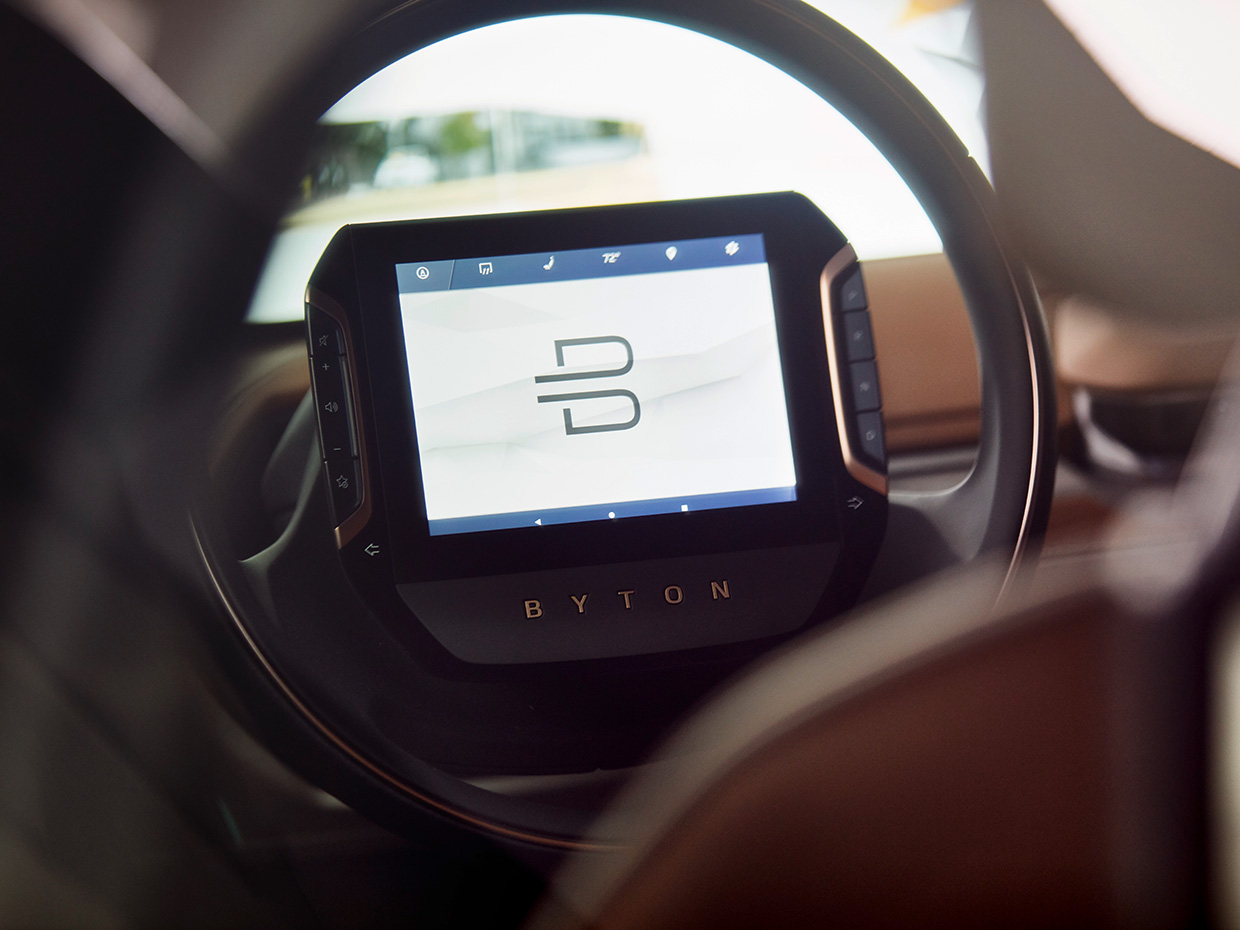The ghost of Faraday Future hovered over the glitzy launch of Byton’s electric, autonomous SUV at CES on Sunday. In 2017, Faraday Future’s billionaire boss Jia Yueting watched in horror as his supposedly self-driving FF91 car failed to park itself at its unveiling. That was just the start of a terrible year that saw Faraday Future abandon plans for a Nevada assembly plant, hemorrhage workers, and make little progress on the FF91.
Byton’s CEO, former BMW executive Carsten Breitfeld, presided over a less disastrous display this year—and despite swirls of dry ice and pumping music, no autonomous antics were even attempted.
The new Byton concept car is designed with self-driving in mind, including the first rotating front seats on a production vehicle, intended to turn the car into a “digital lounge” said Breitfeld. Although the SUV will have only Level 3 autonomy when it hits the streets at the end of next year, it’s designed to be upgraded to Level 4 in 2020. Byton will announce an autonomous technology partner later this month.
The presentation never lacked in hyperbole. “We’re building a next generation smart device to enrich your experience as a driver, and give you time to enjoy whatever you enjoy doing,” said Henrik Wenders, Byton’s VP of marketing. “We’re not redefining cars, we’re redefining life.”
Breitfeld enthused over the vehicle’s “coast to coast” display, actually a 1.25-meter screen spanning the entire dashboard. Its “multidimensional” user interface can be controlled by a handful of gestures, or by simply speaking, courtesy of voice recognition technology supplied by Amazon’s Alexa.

Photo: Byton
This interior shot of the Byton concept car shows a touchscreen tablet at the center of the steering wheel.
The most gimmicky feature is likely to be built-in wellness sensors to measure occupants’ heart rates, blood pressures, and oxygen saturation levels. “The car will act like a wearable and give you meaningful health advice,” promised Byton’s president, Daniel Kirchert. It’s difficult to imagine that advice being anything other recommending less sitting in a digital lounge, and more cycling or walking.
The car will use facial recognition to unlock its doors, and has tiny cameras instead of side mirrors. The steering wheel boasts a touchscreen tablet at its center for easy navigation, and data for entertainment and smart driving features will flow through a 5G internet link at up to 10 gigabits a second.
Byton says that the first car will roll off the production line in 2019, selling in China at first, and arriving in the U.S. and Europe by 2020. If the company succeeds, the first Byton could arrive before most of its owners even have a 5G wireless plan to connect to. Ericsson estimates [PDF] that only about 15 percent of Americans will have access to 5G with gigabit speeds by 2022.
“We’re not redefining cars, we’re redefining life.”
—Henrik Wenders, Byton
Byton is squarely aimed at Tesla’s Model 3, with a base US $45,000 version offering 402 kilometers (250 miles) of range (compared to the 3’s 354 kilometers or 220 miles), and a high performance version with two motors topping out at 523 kilometers. Breitfeld said a fast-charging system would get the car to 80 percent of its range in just 30 minutes.
But how realistic are Byton’s ambitions? In 2016, Faraday Future and fellow Chinese EV start-up Lucid Motors both promised production vehicles within two years. As yet, neither have even started building their factories.
The origins of Byton stretch back to 2014, when Foxconn, the world’s largest contract manufacturer of electronics, bought a stake in Harmony Auto. Harmony Auto is one of China’s largest car dealers, specializing in high-end and electric vehicles, including Teslas. Harmony Auto, Foxconn, and Tencent then signed an agreement to develop their own electric vehicles.
That resulted in the formation in March 2016 of a company called Future Mobility Corporation (FMC), with Breitfeld and Kirchert, another former BMW executive, at the helm. But Foxconn and Tencent got cold feet, forcing Harmony Auto to approach other investors to fund FMC’s expansion. The latest round of funding in August includes investment from a Chinese retailer, a real estate holding company, and at least one state-owned enterprise, according to Chinese media.
Byton is FMC’s vehicle brand and the name of its U.S. arm, which will develop connected and autonomous technologies in Silicon Valley, where it currently has around 130 employees. FMC has just started work on a $1.7 billion factory near its headquarters in Nanjing, which will eventually be capable of producing 300,000 Byton vehicles a year, for which Harmony Auto says FMC will receive multiple incentives from local government.
The plan is for Harmony Auto to provide a sales outlet for Byton vehicles and also manage after-sales service. The company, which remains FMC’s largest shareholder, eventually hopes to take it public. However, FMC has raised a total of just $300 million so far, a small fraction of the billions it will need to reach mass production, even with government help.
Trying to find the money to get there pits Byton head-to-head against other Chinese EV startups in similar positions. Faraday Future has yet to confirm reports that it has raised $1 billion, while Lucid Motors says funds to take its stylish 645-kilometer range Air sedan into production are imminent. Meanwhile, Nio recently announced that the follow-up to its $1.5 million EP9 electric supercar would be a mass-market $70,000 SUV built in China.
A good CES launch is one thing, delivering real cars to paying customers is quite another. Carsten Breitfeld will be hoping that it’s not the ghost of Byton hovering over the launch of yet another new Chinese EV in Las Vegas, at the same time next year.
